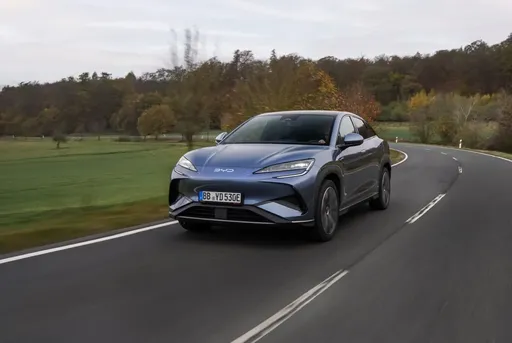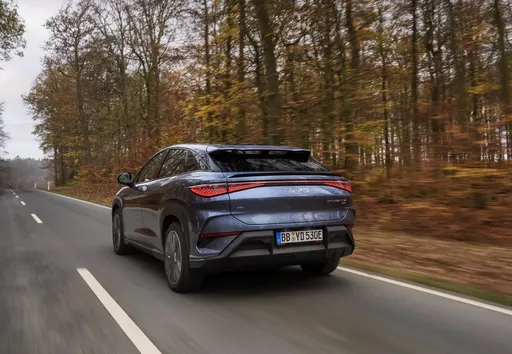Toyota C-HR vs BYD Sealion 7 – Differences & prices compared
Compare performance, boot space, consumption and price in one view.
Find out now: which car is the better choice for you – Toyota C-HR or BYD Sealion 7?
The Toyota C-HR (SUV) comes with a Full Hybrid or Plugin Hybrid engine and Automatic transmission. In comparison, the BYD Sealion 7 (SUV) features a Electric engine with Automatic transmission.
When it comes to boot capacity, the Toyota C-HR offers 447 L, while the BYD Sealion 7 provides 520 L – depending on how much space you need. If you’re looking for more power, decide whether the 223 HP of the Toyota C-HR or the 530 HP of the BYD Sealion 7 suits your needs better.
In terms of consumption, the values are 0.80 L per 100 km for the Toyota C-HR, and 19.90 kWh for the BYD Sealion 7.
Price-wise, the Toyota C-HR starts at 29100 £, while the BYD Sealion 7 is available from 42800 £. Compare all the details and find out which model fits your lifestyle best!
Toyota C-HR
The Toyota C-HR stands out with its distinctive and bold design that combines sleek, angular lines with a sporty posture. Its comfortable and stylish interior is equipped with advanced technology features, providing a seamless driving experience. The vehicle offers impressive handling and performance, making it a compelling choice for those who appreciate a blend of practicality and flair on the road.
details @ Toyota
@ Toyota
 @ Toyota
@ Toyota
 @ Toyota
@ Toyota
 @ Toyota
@ Toyota
 @ Toyota
@ Toyota
BYD Sealion 7
The Sealion 7 captivates with its striking design and impressive performance that appeals to both enthusiasts and casual drivers alike. With a focus on comfort and advanced technology, this model redefines the driving experience, making every journey enjoyable. Its sleek silhouette coupled with an innovative interior showcases the perfect blend of style and functionality.
details @ BYD
@ BYD
 @ BYD
@ BYD
 @ BYD
@ BYD

|

|
|
|
|
Costs and Consumption |
|
|---|---|
|
Price
29100 - 42800 £
|
Price
42800 - 52300 £
|
|
Consumption L/100km
0.8 - 5.1 L
|
Consumption L/100km
-
|
|
Consumption kWh/100km
-
|
Consumption kWh/100km
19.9 - 21.9 kWh
|
|
Electric Range
68 km
|
Electric Range
456 - 502 km
|
|
Battery Capacity
-
|
Battery Capacity
-
|
|
co2
17 - 115 g/km
|
co2
0 g/km
|
|
Fuel tank capacity
43 L
|
Fuel tank capacity
-
|
Dimensions and Body |
|
|---|---|
|
Body Type
SUV
|
Body Type
SUV
|
|
Seats
5
|
Seats
5
|
|
Doors
5
|
Doors
4
|
|
Curb weight
1505 - 1755 kg
|
Curb weight
2225 - 2435 kg
|
|
Trunk capacity
350 - 447 L
|
Trunk capacity
520 L
|
|
Length
4362 mm
|
Length
4830 mm
|
|
Width
1832 mm
|
Width
1925 mm
|
|
Height
1558 - 1564 mm
|
Height
1620 mm
|
|
Payload
375 - 425 kg
|
Payload
410 kg
|
Engine and Performance |
|
|---|---|
|
Engine Type
Full Hybrid, Plugin Hybrid
|
Engine Type
Electric
|
|
Transmission
Automatic
|
Transmission
Automatic
|
|
Transmission Detail
CVT
|
Transmission Detail
Reduction Gearbox
|
|
Drive Type
Front-Wheel Drive, All-Wheel Drive
|
Drive Type
Rear-Wheel Drive, All-Wheel Drive
|
|
Power HP
140 - 223 HP
|
Power HP
313 - 530 HP
|
|
Acceleration 0-100km/h
7.4 - 9.9 s
|
Acceleration 0-100km/h
4.5 - 6.7 s
|
|
Max Speed
175 - 180 km/h
|
Max Speed
215 km/h
|
|
Torque
-
|
Torque
380 - 690 Nm
|
|
Number of Cylinders
4
|
Number of Cylinders
-
|
|
Power kW
103 - 164 kW
|
Power kW
230 - 390 kW
|
|
Engine capacity
1798 - 1987 cm3
|
Engine capacity
-
|
General |
|
|---|---|
|
Model Year
2024 - 2025
|
Model Year
2024
|
|
CO2 Efficiency Class
C, B
|
CO2 Efficiency Class
A
|
|
Brand
Toyota
|
Brand
BYD
|
Toyota C-HR
Revolutionising the Crossover Segment: The Toyota C-HR
The Toyota C-HR has firmly established itself as a standout contender in the compact crossover segment. Known for its distinct design and hybrid capabilities, the C-HR continues to prioritise innovation and efficiency. In this article, we delve into the technical details that make the 2024 iteration a compelling choice for discerning buyers.
Distinctive Design and Aerodynamics
The Toyota C-HR boasts a striking design that combines angular lines with modern aesthetics. This isn't merely for show; the design enhances aerodynamics, improving fuel efficiency and handling. With dimensions of 4362mm in length and a sophisticated structure, the C-HR strikes a balance between urban agility and on-road stability.
Impressive Hybrid Powertrains
The C-HR lineup offers innovative hybrid and plug-in hybrid drivetrain options. The full hybrid system is tailored for those who seek both economic and environmental benefits. It combines a petrol engine with an electric motor to deliver power outputs ranging from 140 to 223 PS, achieving remarkable fuel consumption rates from 0.8 to 5.1 L/100km. The 2.0 Plug-In Hybrid variant impresses with an electric range of 67 km, ideal for urban commuters.
Unmatched Efficiency and Performance
Acceleration figures for the C-HR range from 7.4 to 9.9 seconds to reach 0-100 km/h, ensuring a responsive driving experience. Maximum speeds between 175 and 180 km/h cater to those who appreciate a bit of zest on the open road. Coupled with CVT automatic transmission and both front-wheel and all-wheel-drive configurations, the C-HR adapts to various driving conditions with ease.
Advanced Technology and Features
Inside, the C-HR is equipped with the latest technology aimed at providing connectivity and comfort. The model hosts an array of features across its diverse trim levels, including Business Edition, Lounge, and the sporty GR SPORT. Each variant is designed to meet the demands of different lifestyles, ensuring there's a C-HR model to suit every taste.
Sustainability and Cost Efficiency
With CO2 emissions ranging from 19 to 115 g/km, the C-HR stands as a testament to Toyota's commitment to sustainability. Financially savvy consumers will also appreciate the running cost, with monthly expenses from €959 to €1204, and a cost per km as low as 38.4 cents. Such efficiency makes the vehicle an attractive option for eco-minded buyers.
Conclusion: A Forward-Thinking Choice
The 2024 Toyota C-HR embodies Toyota's forward-thinking approach to automotive innovation, blending eco-friendly hybrid technologies with stylish design and practicality. It offers a glimpse into the future of driving, where efficiency meets elegance. Whether you're a city dweller or an adventure seeker, the C-HR promises a driving experience that is both enjoyable and environmentally conscious.
BYD Sealion 7
The automotive landscape is evolving faster than ever, and one model capturing significant attention is the BYD Sealion 7. This electric SUV not only marries performance with sustainability but also boasts innovations that redefine user expectations. Let’s dive into the technical aspects and standout innovations of this remarkable vehicle.
Powerful Performance and Versatile Configurations
The BYD Sealion 7 comes in several configurations, catering to diverse performance needs. It offers two versions of electric all-wheel drive, producing an impressive 530 horsepower, while the rear-wheel drive variant delivers a solid 313 horsepower. This spectrum of power allows drivers to select an option that aligns with their driving style and requirements.
Acceleration is another noteworthy aspect of the Sealion 7. The rear-wheel drive model achieves 0-100 km/h in just 6.7 seconds, while the all-wheel drive variant does it in a breathtaking 4.5 seconds. This combination ensures that the Sealion 7 doesn’t just compete; it leads in performance within its segment.
Innovative Electric Drive and Efficiency
Equipped with a cutting-edge reduction gearbox, the BYD Sealion 7 not only delivers incredible acceleration but also underscores efficiency with a consumption rate as low as 19.9 kWh per 100 km for the most efficient model. The all-wheel drive variants have slightly higher consumption rates of 21.4 kWh and 21.9 kWh, respectively, but they still perform admirably when it comes to efficiency.
In terms of electric range, the Sealion 7 showcases a commendable performance. Depending on the specific configuration, it offers ranges between 456 and 502 km on a single charge, making it a competitive choice for those concerned about range anxiety typical of electric vehicles.
Sleek Design and Practicality
Beyond performance and efficiency, the BYD Sealion 7 impresses with its aesthetic appeal and practicality. With dimensions of 4830 mm in length, 1925 mm in width, and 1620 mm in height, this SUV is designed for presence. Moreover, the spacious interior comfortably accommodates up to five passengers, enhancing its usability for families and adventure seekers alike.
Practical features like a trunk capacity of 520 liters ensure that the Sealion 7 stands ready for any journey, whether it’s a weekend road trip or daily commuting. Additionally, the vehicle has a payload capacity of up to 410 kg, providing flexibility for carrying cargo without sacrificing comfort.
Safety and Eco-Friendliness
The BYD Sealion 7 also excels in safety and sustainability. It holds a CO2 efficiency class of A, making it an environmentally friendly option with zero emissions during operation. This aligns with the growing consumer demand for greener transportation solutions.
Furthermore, the vehicle is engineered with multiple safety features that ensure a secure driving experience for all occupants, a crucial element that underscores the ongoing commitment by BYD to safety in electric vehicles.
Final Thoughts
As an emblem of electrification in the automotive industry, the BYD Sealion 7 stands out with its combination of powerful performance, innovative technology, and eco-friendly credentials. For those exploring the electric SUV market, this vehicle represents a significant milestone, offering a compelling argument for drivers looking to transition to a more sustainable yet thrilling driving experience.
Which drive types are available for the Toyota C-HR?
Available as .
The prices and data displayed are estimates based on German list prices and may vary by country. This information is not legally binding.
